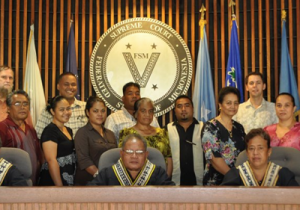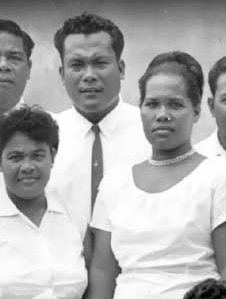 This year’s FSM National Law Day debates will take place on July 12, 2013 in Chuuk State home of the defending champions from Chuuk High School. The best high school debate teams from each of the four states in the country of the Federated States of Micronesia will be debating on this year’s topic:
This year’s FSM National Law Day debates will take place on July 12, 2013 in Chuuk State home of the defending champions from Chuuk High School. The best high school debate teams from each of the four states in the country of the Federated States of Micronesia will be debating on this year’s topic:
“Be it resolved that the FSM Constitution should be amended to create an additional at-large seat in the FSM Congress for each of the four states, election to which shall be open only to women candidates.”
What can we learn about the issue? I had originally posted this article in 2009 on the Chuuk Reform Movement website in response to FSM Congressional Bill (C.B. #15-169) introduced by FSM Congress Speaker Isaac V. Figir (Yp) and Congressman Resio S. Moses (Pn). I think it’s time to repost it in preparation for the upcoming debates.
Congressional Bill 15-169 officially politicized the role of women in Micronesia. It proposed, for good or bad, to amend the FSM Constitution “for the purpose of increasing the representation of women in Congress by increasing the number of at-large seats in Congress, and reserving said seats for women…”
Is Chuuk ready to embrace the idea of sending women to Congress? Is it fair to include a gender-specific seat among the election district-specific seats in Congress? Is it worth increasing the annual budget for Congress to have two more seats at Palikir? Are two seats proportionate to the number of female citizens in our nation? Are we so oppressive to our women in Micronesia that we now have to protect their rights through the quota system of representation? Are there other oppressed groups to whom we ought to give equal protection by giving them their own seat in Congress?
Readiness: Chuuk is undergoing a leadership redefinition stage among the generations of women. How ready are we to embrace this forward-thinking idea of sending Chuukese women to Congress? I can’t speak for anyone else, but I applaud this progressive idea of providing equal representation for the women citizens. I am not so sure though that the older generation of Chuukese women would fully embrace the notion that women necessarily have to lead in such prominent leadership roles. They would claim, and I have heard it said, that these publically elected positions are best reserved for their male counterparts. I think they would claim that putting women in public offices run counter to our Chuukese culture. I certainly disagree with this notion that having women in politics is counter to our Chuukese culture and values.

This photo shows the first Chuukese women elected to the Truk State Legislatures in the 1960’s. Click on photo to visit the album entitled, “Where Were The Women?” on Micronesian Seminar. Photo courtesy The Micronesian Seminar.
Women have always led albeit behind the scene, but leaders nonetheless. If publicly elected office is a true manifestation of true leadership in Chuuk, then Chuukese women have already been elected into the Chuuk State Legislature as proven by the late Mrs. Miter Nakayama and Denita Bossy both of whom proved beyond any reasonable doubt their equal worth in a male dominated role. Were they exceptions or bonafide representatives of the capacity of Chuukese women to succeed in the Chuukese political arena? Certainly, the two women in particular could very well be exceptions, but I believe they also represent the capacity of our women to lead. For the most part, I would say the majority of women in Chuuk prefer to lead in their quiet and unassuming ways behind their brothers and male relatives…not that there’s anything wrong with that choice of leadership role.
But what happens when our culture makes it taboo for men to talk about women’s issues such health, reproductive rights, self-esteem issues, and others? Afterall, it is not uncommon in our Chuukese culture for men to refrain from talking about serious roles of women. I am quite certain that our cultural norms does not favor women discussing their health and reproductive rights with their male representatives either privately or publically. With those cultural realities in Chuuk we can probably assume that the women’s rights and issues have not been adequately discussed in village meetings with the male representatives. Do we continue to hope that the few outspoken women bring these issues to the forefront of their representatives? Or should we empower women by having women representatives to advocate for women’s rights and issues on the national arena? It seems to me the answer is inevitable.
Fairness: Is it fair to include a gender-specific seat among the population-specific seats in Congress? Perhaps even more specifically, is it fair to allocate 2-at large seats for women which could advantage the more populated states? Is it conceivable given the current way the bill is written that Chuuk could essentially overwhelmingly elect two Chuukese women every term? If so, is that fair to other women in the other states? This obviously brings back the old fear of a Chuukese president if citizens were to vote for our nation’s head of state. Should there be a similar type of ladies pact (like the “gentlemen’s agreement” for the presidency) to rotate the two at-large seats among the four states for an equitable representation of our nation’s women issues?
Since the intent of the bill is to increase women’s representation in a male dominated Congress, then should only women voters elect their representatives? It seems only fair that women voters be given the right to choose who represents their interest nationally much like only Chuukese or Yapese citizens can vote for their at-large representatives in Congress? If we are serious about empowering women, then we men should have absolutely no right to impose our choices on our female citizens. We may have to revise the current voting protocol and ballots to ensure only female voters have the female candidates on their ballots, but that’s a logistical problem that can be easily remedied.
Historical: Chuukese women have been far more effective in ushering in real social changes than men. Their priorities are often different from the male-dominated legislators including education, alcohol abuse, health issues, domestic violence, suicide. In the 70′s, Chuukese women successfully mobilized to stage silent protests at the Chuuk Legislature to demand a ban on the import and selling of alcohol in the State. Their action led to laws that prohibited the selling and consumption of alcohol throughout the State. Chuuk enjoyed years of peace until corrupt businessMEN / politicians began to slowly change the laws to favor their own “members-only” establishments that sold alcohol. It wasn’t uncommon for politicians to own bars such as the infamous Key Club, Black Roses, Rusty Anchor, etc.
Fiscal: Can the nation afford to increase the operating budget for Congress with two additional members? Is it worth the money? At a time when most countries are feeling the impact of the global financial crisis and FSM continues to rely on Compact funding, is that the best use of our limited financial resources? Has it been proven that having seats specifically reserved for women necessarily lead to positive impact on women’s issues and concerns? I would argue that having equal representation of our women population is a matter of justice. As such, no amount of fiscal sacrifice should ever stand in the way of justice. But of course we shouldn’t do it at the expense of equally important resources for education which I still think is the top priority for our nation.
Could we maintain fiscal responsibility while simultaneously achieve the intent of this bill? Instead of creating two additional seats in Congress which would obviously be costly, what if we simply put a provision in the Constitution requiring that at least one of the current seats from the more populous states of Pohnpei and Chuuk be reserved specifically for women? Afterall, it would be nearly impossible for a Kosraean or Yapese woman to be elected to an at-large seat in Congress given their population.
Effectiveness: It has already been proven that this type of deliberately reserving of seats for women has had a “definite and positive impact on the political participation of women.” According to studies conducted by the Panchayat Raj Institution in India where one third of seats in local bodies have been reserved for women members and chairs, this practice has contributed to positive results for women’s issues. In Bangladesh and India, two countries not much different in terms of a male dominated culture, significant results have been achieved by reserving 30 seats out of 300 elected seats (Bangladesh) and one third of seats in local bodies as members and chairpersons, have “gained a sense of empowerment by asserting control over resources and officials and by challenging men.”
But the nagging questions remain: Does FSM really have the same problem of religious and cultural oppression that exist in other parts of the world which justifies this type of legal protection of their rights through the legislative means? Does our Chuukese culture oppress our women to the point where they are voiceless? Do we persecute our women for aspiring to be leaders in their communities? Are our women prevented from running for public office lest they be publically humiliated or worst hanged? If we answer affirmatively to these questions, then of course we must do all we can to protect them. I may be completely off on this (and I seek women’s opinions), but it doesn’t appear to me, at least in Chuuk, that we have gone that far? Sure, there are certainly cultural bias and differing opinions on what constitutes appropriate leadership roles for our women, but women have very strong voices in Chuuk. They are not persecuted nor are they prevented by our cultural, religious, or legal systems to seek public office if they want to or qualified. Perhaps this bill is unwarranted.
Is it possible that this bill might actually have an unintended consequence of creating a culture of prejudice against women? By having a quote system for women are we setting ourselves up to fail in the bigger need to challenge how men view the role of women in our communities? Should we actually do a better job at home and in our schools to teach our young women to believe in themselves and to value their equal rights among men? Equally important to empowering our young women, perhaps we improve how we teach the young men to value the leadership role of women in our midst? And for us older men, are we due for major attitudinal adjustments towards how we value the equal rights and capabilities of women in any leadership roles. Perhaps the bill introduced by these two respectable congressmen should be about improving our curriculum in our schools to include educational programs that strengthen how we value the role of women in ALL facets of lives. I’m afraid that we might compartmentalize women’s roles by simply letting them vote for their own representatives when we all should be checking how we value their roles in our midst and elect women into office just like we would for men.
Proportionality: Are two seats proportionate to the number of female citizens in our nation? While two seats for women in a Congress seems plentiful given there are only 14 congressmen, we can just as easily ask, “why only two?” What is the basis by which the number of women representatives was arrived? How many women are there in Micronesia anyway? If Chuuk alone has two at-large seats, is the women population in our nation equal to the Chuukese population? Or are there more women in our nation which warrants more representatives?
Is it possible for two women to adequately represent all the varying needs of our women citizens throughout Micronesia? We certainly can’t assume that what Chuukese women consider important is necessarily a top priority in Kosrae or vice versa. How do we ensure that the priorities of the more traditional outer island women aren’t being trumped by those in the more populated main centers? Or should we ensure that all the women in all four states be represented by having two seats reserved for Yapese and Kosraean women while requiring Chuuk and Pohnpei with their 3 and 5 seats respectively to reserve one seat each for women? Then there would be 4 women in Congress to represent each of the four states. Would that be a fair proportionate representation of our women citizens?
Equality: How do we determine whose rights and issues should be represented in Congress? If we start with women what will prevent other voiceless groups (youth, diasboric population, teachers, clans, etc) from demanding equal representation in Congress? What are we communicating to future generations of FSMers about our values? Are we inadvertendly or deliberatedly giving privilege to one group over another?
Lastly, it is clear to me that there isn’t going to be a sure way to meet the varied needs of our female citizens. But one thing for sure, we cannot simply stand in fear of the unknown questions. We must start somewhere and women’s representation is worth all our collective efforts.
Met mefiom?







Vid, is there an update on this debate/issue? This article is awesome. If there is any update, please point me in the right direction. Kinisou 2x.